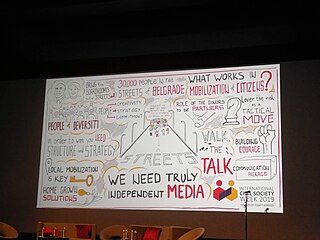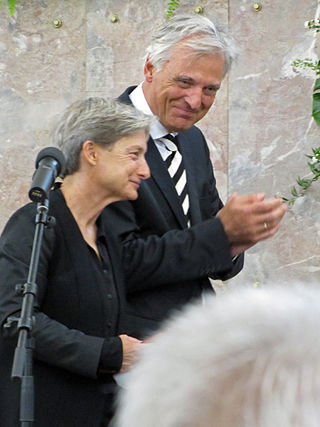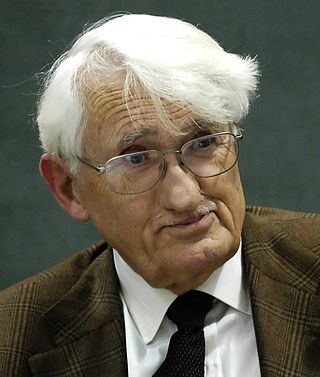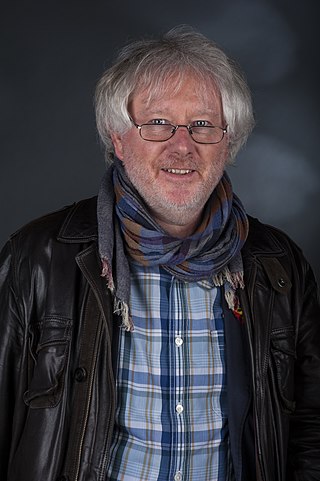
Jürgen Habermas is a German philosopher and social theorist in the tradition of critical theory and pragmatism. His work addresses communicative rationality and the public sphere.

Civil society can be understood as the "third sector" of society, distinct from government and business, and including the family and the private sphere. By other authors, civil society is used in the sense of 1) the aggregate of non-governmental organizations and institutions that advance the interests and will of citizens or 2) individuals and organizations in a society which are independent of the government.

.eu is the country code top-level domain (ccTLD) for the European Union (EU). Launched on 7 December 2005, the domain is available for any person, company or organization based in the European Union. This was extended to the European Economic Area in 2014, after the regulation was incorporated into the EEA Agreement, and hence is also available for any person, company or organization based in Iceland, Liechtenstein and Norway. The TLD is administered by EURid, a consortium originally consisting of the national ccTLD registry operators of Belgium, Sweden, and Italy, joined later by the national registry operator of the Czech Republic. Trademark owners were able to submit registrations through a sunrise period, in an effort to prevent cybersquatting. Full registration started on 7 April 2006.

Zygmunt Bauman was a Polish-born sociologist and philosopher. He was driven out of the Polish People's Republic during the 1968 Polish political crisis and forced to give up his Polish citizenship. He emigrated to Israel; three years later he moved to the United Kingdom. He resided in England from 1971, where he studied at the London School of Economics and became Professor of Sociology at the University of Leeds, later emeritus. Bauman was a social theorist, writing on issues as diverse as modernity and the Holocaust, postmodern consumerism and liquid modernity.
In sociology, the term rationalization was coined by Max Weber, a German sociologist, jurist, and economist. Rationalization is the replacement of traditions, values, and emotions as motivators for behavior in society with concepts based on rationality and reason. The term rational is seen in the context of people, their expressions, and or their actions. This term can be applied to people who can perform speech or in general any action, in addition to the views of rationality within people it can be seen in the perspective of something such as a worldview or perspective (idea). An example of rationalization can be seen in the implementation of bureaucracies in government is a kind of rationalization, as is the construction of high-efficiency living spaces in architecture and urban planning. A potential reason as to why rationalization of a culture may take place in the modern era is the process of globalization. Countries are becoming increasingly interlinked, and with the rise of technology, it is easier for countries to influence each other through social networking, the media and politics. An example of rationalization in place would be the case of witch doctors in certain parts of Africa. Whilst many locals view them as an important part of their culture and traditions, development initiatives and aid workers have tried to rationalize the practice in order to educate the local people in modern medicine and practice.

The Theodor W. Adorno Award(Theodor-W.-Adorno-Preis) is a German award intended to recognize outstanding achievement in philosophy, theatre, music and film. It was established by the city of Frankfurt in 1977 to commemorate the sociologist and philosopher Theodor Adorno, who had taught at the University of Frankfurt for twenty years. The award is conferred every three years on 11 September, Adorno's birthday. The prize money is 50,000 Euro.
Henning Meyer is a German social scientist, consultant and policy specialist. He is the first Fellow of the German Federal Ministry of Finance and honorary professor for Public Policy and Business at the Eberhard Karls University of Tübingen. Furthermore, he is research associate at Cambridge University’s Centre for Business Research (CBR), Future World Fellow at the Centre for the Governance of Change at IE University and founder and editor-in-chief of Social Europe. Previously, he was John F. Kennedy Memorial Fellow at the Minda de Gunzburg Center for European Studies at Harvard University, senior visiting fellow and research associate at the London School of Economics and Political Science and visiting fellow at Cornell University.
In social science, disenchantment is the cultural rationalization and devaluation of religion apparent in modern society. The term was borrowed from Friedrich Schiller by Max Weber to describe the character of a modernized, bureaucratic, secularized Western society. In Western society, according to Weber, scientific understanding is more highly valued than belief, and processes are oriented toward rational goals, as opposed to traditional society, in which "the world remains a great enchanted garden".
Leitkultur is a German concept, which can be translated as 'guiding culture' or 'leading culture', less literally as 'common culture', 'core culture' or 'basic culture'. The term was first introduced in 1998 by the German-Arab sociologist Bassam Tibi and from 2000 onward the term figured prominently in the national political debate in Germany about national identity and immigration.

Constitutional patriotism is the idea that people should form a political attachment to the norms and values of a pluralistic liberal democratic constitution rather than to a national culture or cosmopolitan society. It is associated with post-nationalist identity because, while it is seen as a similar concept to nationalism, the attachment is based on the constitution rather than on a national culture. In essence, it is an attempt to re-conceptualize group identity with a focus on the interpretation of citizenship as a loyalty that goes beyond individuals' ethnocultural identification. Theorists believe this to be more defensible than other forms of shared commitment in a diverse modern state with multiple languages and group identities. It is particularly relevant in post-national democratic states in which multiple cultural and ethnic groups coexist. It was influential in the development of the European Union and a key to Europeanism as a basis for multiple countries belonging to a supranational union.

John Adam Tooze is an English historian who is a professor at Columbia University, Director of the European Institute and nonresident scholar at Carnegie Europe. Previously, he was Reader in Twentieth-Century History at the University of Cambridge and Gurnee Hart Fellow in History at Jesus College, Cambridge.
Rodrigo Jokisch is a German sociologist.

Jayati Ghosh is an Indian development economist. She taught economics at Jawaharlal Nehru University, New Delhi for nearly 35 years, and since January 2021 she has been Professor of Economics at the University of Massachusetts Amherst, USA. Her core areas of study include international economics and globalisation, employment patterns in developing countries, macroeconomic policy, and gender and development.
Lutz Wingert is a German philosopher who is sometimes identified as one of the "Third Generation" of the Frankfurt School of philosophy. He is a professor of philosophy focusing on practical philosophy at the Swiss Federal Institute of Technology Zurich and a member of the Zentrum Geschichte des Wissens. He is a former student of, and a co-author with, Jürgen Habermas, a founding member of the Frankfurt School. Wingert is a former chair of practical philosophy at the University of Dortmund. Along with Wilfried Hinsch, he edits the Ideen & Argumente series.
Arena is an independent Australian critical and radical publishing cooperative that has been continuously producing writings since its founding in 1963. Established by figures in Australia’s ‘New Left’, Arena is a forum to debate and develop new ideas about society and the world, occupying a unique place in Australian cultural and intellectual life ever since. Arena’s editors and authors share a commitment to creating a genuinely and fully human society for all—a society that draws on left social and political traditions and a ‘green’ revisioning of the world but goes beyond simple or entrenched versions of those ideas. Arena is especially interested in how people and communities draw on complex cultural histories and life-ways that may defy the logic of late capitalism, and on which basis the social might be understood anew.
The Leipzig Book Fair Prize is a literary award assigned annually during the Leipzig Book Fair to outstanding newly released literary works in the categories "Fiction", "Non-fiction" and "Translation". The Leipzig Book Fair Prize has been awarded since the Deutscher Bücherpreis was ceased in 2005, and is one of the most important literary awards in Germany. The winner in each category is awarded €15,000.

The old states of Germany is a jargon referring to the ten of the sixteen states of the Federal Republic of Germany (FRG) that were part of West Germany and that unified with the eastern German Democratic Republic's 5 states, which are given the contrasting term new states of Germany. Usage of this terminology usually excludes one other state, Berlin, conterminous with the capital city of the reunified nation which used to be divided, with its western part linked with West Germany.

Jürgen Klute is a German politician, social pastor, and co-publisher. He was a member of the European Parliament from 2009 to 2014. Klute is married and has two children.
The Axel-Springer-Preis is an annually awarded prize. The Award is given to young journalists in the categories print, TV, radio, and online journalism due to the decisions of the Axel-Springer-Akademie.

Sheri E. Berman is a Professor of Political Science at Barnard College, Columbia University. She is the author of scholarly books and articles on European social democracy, fascism, populism and the development of democracies and dictatorships.










